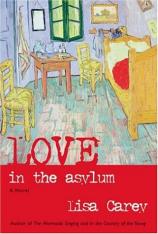Love In The Asylum
Review
Love In The Asylum
Love is a complicated thing. It is complicated enough without the
added stresses of extreme factors such as mental or physical
illness, drug addiction or a difficult childhood. But as Lisa Carey
demonstrates in her latest novel, LOVE IN THE ASYLUM, love happens
and flourishes regardless of such circumstances. And sometimes love
grows in the most unlikely of places.
Alba Elliot, a children's author, has been suffering with
debilitating mental illness for the past ten years. She has been in
and out of the Abenaki Mental Hospital all of that time. Cool and
jaded, masking a deep sadness and loss, Alba feels comfortable in
the walls and on the lawns of Abenaki. When heroin addict Oscar
Jameson is admitted to the drug rehab unit, Alba's comfort is
challenged. The attraction between the two is almost instantaneous,
but neither is prepared emotionally for what they are feeling.
Thirty-year-old Oscar is detoxing and is not convinced rehab is the
place for him or that he is finally done with drugs. He is
fascinated by Alba but still preoccupied with drugs and his own
issues, not in the least his troubled relationship with his
brother. Alba likes Oscar but hates the fact that he is a junkie.
Both have a complicated past that colors all they do and feel in
the present. Still, on the lawn of Abenaki, something is developing
between them.
Around the time Oscar is checked into Abenaki, Alba, while working
in the hospital library, comes across a series of letters from a
woman who was a patient to her young son. In the 1930s Mary Doherty
was put in the hospital by her husband, and there she remained
until she died almost ten years later. She was accused of hysteria,
of setting fires and believing herself to be a powerful healer in
touch with the realm of the dead. As Alba reads the letters, never
sent as Mary was forbidden contact with her family, she learns more
and more of Mary's tragic history. Mary, whose real name was
Mesatawe, was an Abenaki Indian, gifted with a unique power
(diagnosed later by doctors as epilepsy and treated with
electroshock therapy), and a drive to help heal the other women at
the hospital. As we read the letters along with Alba we learn of
Mary's special connection to her son Peter, the intended recipient
of the letters.
Mary's letters to Peter reopen a never quite healed wound in Alba,
and soon Alba and Oscar run away from the hospital in search of the
now elderly Peter and a type of healing impossible within the walls
of Abenaki.
LOVE IN THE ASYLUM is not just the story of Alba and Oscar,
although their tentative, sweet and emotionally difficult affair is
at the center of the novel. It is also the story of familial love.
There is the enabling love between Alba and her father, and there
is the frustrating love between Oscar and his brother, where a
violent past lays just below the surface. There is especially the
love of mothers for sons; Mary's for Peter and the raw love that
Alba feels for the son she lost a decade ago.
Carey's novel is wonderfully written, honest and emotional without
sentimentality. It is simply a joy to read. She successfully weaves
the stories of Alba, Oscar and Mary and unifies them into a
poignant whole. The devastating losses felt by the characters are
offset with just enough humor to keep the novel from being sappy,
boring or overly tragic. Despite the fact that the novel wraps up a
little too neatly at the end, this is a highly recommendable novel
from a creative and talented author.
Reviewed by Sarah Rachel Egelman on January 7, 2011
Love In The Asylum
- Publication Date: April 1, 2004
- Genres: Fiction
- Hardcover: 304 pages
- Publisher: William Morrow
- ISBN-10: 006621288X
- ISBN-13: 9780066212883




